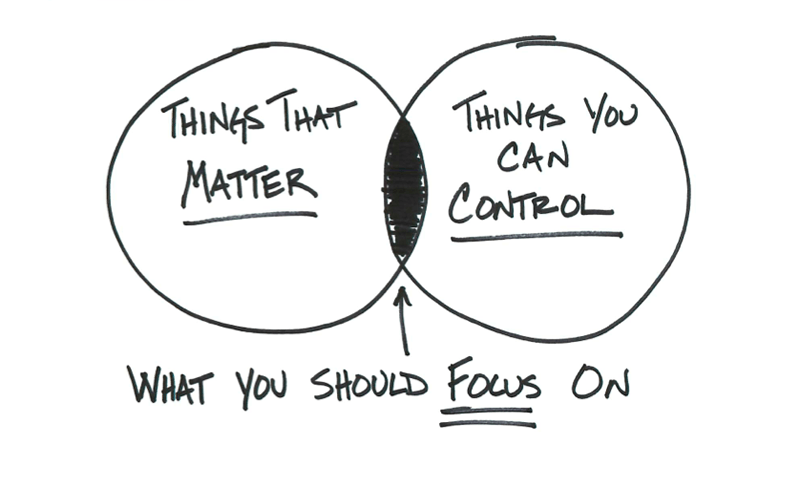What I'm reading #51: Focus on things you can control, that matter


Epictetus said "the more we value things outside our control, the less control we have."
I'm sure, like me, you've been there.
You’re frustrated.
You lose it and start yelling as your blood pressure climbs.
Later on in the day, you feel a little bit embarrassed.
You realise you lost your cool over something that was stupid to lose your cool over.
Sound familiar?
I'm not unique.
I often have to remind myself of the words of Victor Frankl "between stimulus and response there's a space, in that space lies our power to choose our responses, in our response lies our growth and freedom."
It's easy to worry about things that don't matter or which we have no control over.
(particularly with it comes to investing).
If we don't want to lose our cool, we need to get crystal clear on what we want out of life.
On the things that matter to us.

It's easy to let ourselves ruin our day by getting upset over something that happened during the commute or while queuing for our coffee.
In the grand scheme of life, those things really don't matter.
What matters are things that impact you...
Your personal values and how these align with the choices we all make regarding how we align our time, attention, intellectual and financial capital with what we feel is important to each of us.
The Dalai Lama once said,
“If a problem is fixable, if a situation is such that you can do something about it, then there is no need to worry. If it's not fixable, then there is no help in worrying. There is no benefit in worrying whatsoever.”
In Christianity, the Serenity Prayer has you ask God for the serenity to accept the things you can't change, the courage to change things you can, and the wisdom to know the difference.
One of the most important tenets of the ancient philosophy of Stoicism is the dichotomy of control.
The idea of focusing on things we can control is not new; it's quite ancient. Yet so much of our energy is spent feeling bad about things that are outside of our control.
It takes some practice, but getting clear about the things you can and can't control will help your overall well-being and is something I personally find extremely difficult in practice.
Here are 3 ways to look at it.
1. Things that matter, but you can't control
There are likely many things that matter to you.
The trick, then, is to get very clear about whether or not these things are within your control.
The state of the economy, the markets, interest rates...
May matter to your long-term financial health, but you have no control over them.
Your relationship with your coworkers may matter to you. Sadly, we don't have control over other people's opinions of us.
There are some things for which you might have partial control, say, when something happened you feel you should have prevented or mitigated.
You might have made a mistake, for example.
In these cases, because you might consider these to be errors that were a direct result of your actions - it might seem like it's in your control.
However, these things are in the past.
What is in your control is whether or not you learn from them.
If it's outside of your control, you can't do anything about it, then give yourself permission to not worry about it.
2. Things you can control, but that don't matter
Just because we have control, doesn't mean it matters.
So the waiter brought you the wrong dessert; is that worth getting angry about?
If somebody cuts you off in traffic, does that actually impact your life?
You have control over how much time and attention you give to the financial media, who are in the business of promoting fear and selling adverts.
The stock market's day-to-day movements don't matter to you.
If it doesn't matter, don't worry about it. Spend your time, energy, and attention in better ways.
3. Things you can't control and don't matter
These should be the easiest to let go of...
Your neighbour just bought their third new car in four years.
Your friend just went on a really expensive trip.
Your sister-in-law just bought a brand new house in a fancy neighborhood.
Their actions don't matter to you and are outside your control.
These things are not worthy of your attention.
Focus your attention, time, energy, and money on that sweet spot.
Pay attention to things that will bring you joy and peace...
On things that both matter to you and that are inside your control.
Your savings, spending, life aspirations, when you retire...
Your exposure to risky investments, how much insurance to buy, and how to spend your time.
Design a life that you'll be happy and proud to live.
Align your use of money with what's important to you. Your time and attention are limited resources; don’t give them away.

